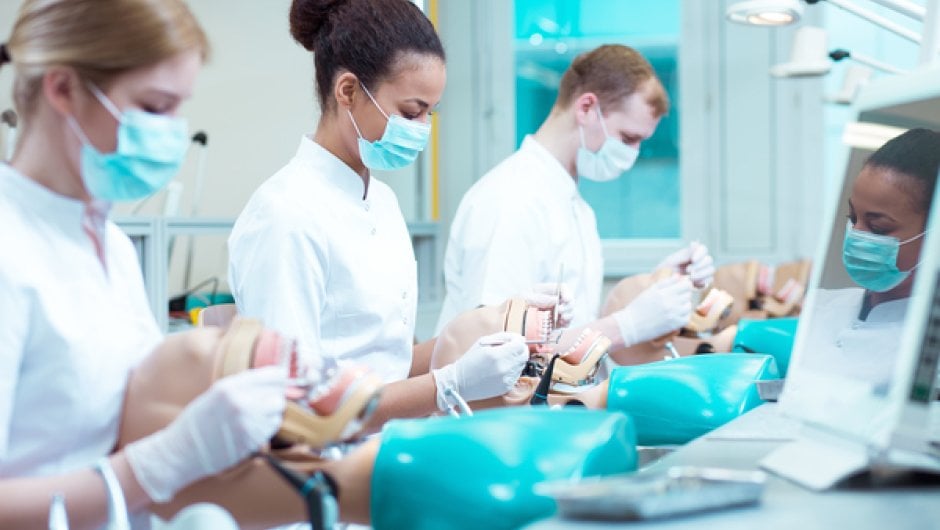Dentistry comes with high job satisfaction, as you get to know and treat patients in your community, alongside a good salary, and long-term job prospects. The government needs more dentists working in the NHS, so there’ll likely be a job waiting if you want it when you graduate.
You could work up to consultant level – and a six-figure salary – or take your skills and work anywhere in the world.
As a dental student, you’ll gain lots of practical hands-on experience, applying a combination of medicine, science, people skills, and many other disciplines.
The impact you could make
- Become an NHS dentist in your local town or city, and make a difference to people’s lives.
- Specialise in a key area of dentistry like paediatric, cosmetic and aesthetic, or orthodontics.
- Explore new and emerging scientific technologies, like artificial intelligence, to improve patient care and treatment.
What you could study
- Foundations of dentistry
- Human health and disease
- Patient assessment
- Evidence-based practice
- Oral biology
- Peridontology
- Paediatric dentistry
- Digestive, renal, and endocrine systems
- Healthcare ethics and law
Example module
Example assignment
Work placement
Subjects it's useful to have studied first
Some dentistry courses or apprenticeships will have requirements for previous qualifications in certain subjects. Entry requirements vary, so always check with the provider.
Biology
Chemistry
Maths
Physics
Hard skills you'll develop
- Dental surgery
- Sedation
- Clinical governance
- Dental specialisms like orthodontics
Soft skills you'll develop
- Communication
- Resilience
- Mentorship
- Teamwork
- Ethical standards and conduct
Careers: Where it can take you
Find out more about your career prospects from studying dentistry. The following information is based on a typical dental practitioner role.
Available jobs
Average salary
Career options
Dentistry
Dentist (NHS, private, military, etc.)
Technical and technology
86%

What is an… endodontist?
You might be wondering exactly what the difference is between a dentist and an endodontist. An endodontrist undertakes extra medical training beyond a dentistry degree. They specialise in treating the interior of the tooth, or dental pulp, and diagnosing tooth pain. They try and focus on ‘saving’ the tooth and will carry out surgery, root canal treatment, or tooth restoration at a more specialist level.
Find your ideal career
Take our careers quiz to find your ideal job matched to your personality type.Getting in: Entry requirements
Find out more about what you'll need to study dentistry at university or as an apprenticeship.
Average requirements for undergraduate degrees
Entry requirements differ between university and course, but this should give you a guide to what is usually expected from dentistry applicants.
A levels
Scottish Highers
Vocational
Admissions tests

Health and science apprenticeships
Check out our industry guide to help you decide if a health and science apprenticeship might be the right choice for you.Other subjects you may be interested in
Considering an apprenticeship?
Applying for an apprenticeship is just like applying for a normal job. Here’s what you need to know:
-
1
Deadline
Apprenticeships don't follow the same deadlines as applying to uni, the deadline is down to the employer. -
2
Where to apply
You apply directly through the employer. -
3
No limits
You're not restricted to one apprenticeship application; you can do as many as you like. -
4
Apply to university and apprenticeships
There's nothing stopping you applying to university through UCAS, while also applying for apprenticeship vacancies. -
5
Find out more
Read our guide to health and science apprenticeships.

Apprenticeship vacancies
Check out live apprenticeship vacancies in health and scienceExplore further
Go deeper into topics around dentistry with the following:-
1
British Dentistry Journal
Covering key issues and developments in dentistry, this journal published on behalf of the British Dental Association will keep you informed on industry topics. -
2
Smile with Sola YouTube channel
Sola, a fourth year dental student, creates videos and features documenting her life as a dental student. -
3
Nuffield Trust website
The Nuffield Trust provides independent research into health and care policy in the UK, including dentistry. Scroll through some of their research and analysis to understand the industry, particularly dentistry in the NHS.
Application advice
Whether it's personal statement tips or what to write in a cover letter for an apprenticeship application, our application advice will help you get ahead in your dentistry journey.Skills, experiences, and interests to mention
- Studying dentistry is a five-year commitment, so show you understand this. You could mention other things you've committed to over a long period of time, like learning a musical instrument or going up through Beavers to Scouts or Rainbows to Guides.
- You’ll also need to explain why you’ve chosen this career. Think beyond the salary to how you want to make a difference or help people. What watching or reading have you done that shows you understand what dentistry involves?
- Reference any relevant work experience, whether in a hospital, dental practice, or even a lab. Explain what you learned from this experience or observation. If you’ve not got specific experience, think about caring roles you may have had during a part-time job like child-minding or working in a care home, or times when you’ve used social and communication skills interacting with the general public.
- What personal qualities can you highlight? When have you demonstrated resilience, maybe in the face of illness or other adverse events? How will your qualities stand you in good stead for a demanding dentistry career?
- What about your hobbies? What makes you interesting as an individual and what skills, like leadership or self-motivation, come through from your outside interests?


